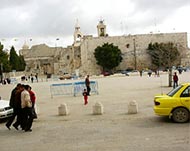UN: Bethlehem in economic isolation
A new United Nations report finds Israeli policies in the wake of the Palestinian Al-Aqsa Intifada have caused serious economic hardship for the people of Bethlehem.

The report, Costs of Conflict: The Changing Face of Bethlehem, has determined Bethlehem residents live in almost complete isolation of their Jerusalemite and West Bank neighbours, quarantined off by a series of roadblocks, checkpoints, illegal Jewish settlements and stretches of concrete blocks put in place by Israeli occupation forces over the course of the last four years.
They are prevented from travelling to and worshiping in nearby Jerusalem.
As a result of these and other restrictive Israeli measures, Bethlehem has suffered serious economic losses, with a majority of businesses having had to relocate or close, found the report.
Construction on the controversial separation barrier around Rachel’s Tomb have lead to the closure or relocation of 72 of the 80 Palestinian businesses in the area.
Decimated economy
Compiled by the Office for the Coordination of Humanitarian Affairs (OCHA) and the Office of the Special Coordinator for the Peace Process in the Middle East (UNESCO), the report expects yet another sombre Christmas as tourist numbers are expected to further drop.
 |
|
Israeli policies have isolated |
The number of tourists visiting Bethlehem has dwindled from 91,726 in 2000 to a mere 7,249 in 20040 – a drop of over 90%. The result has been devastating for the local Palestinian population – a town that was once thrived on its tourism industry is now on the brink of poverty.
“Bethlehem’s self-sufficiency has also diminished with the loss of tourists and pilgrims due to the conflict and to movement restrictions. Before the Intifada the people of Bethlehem had a much lower rate of dependency on Israel for work …Today with the tourism sector decimated, most residents can barely make a living,” the report said.
There has also been a marked increase in emigration of Bethlehem’s indigenous Christian community. Once equal in number to their Muslim counterparts, some 9.3% of Bethlehem‘s Christians have been forced to emigrate since the outbreak of the Intifada in September of 2000 due to “the lack of economic and social options”.
“Israeli policies, including Israeli settlements, restricted roads and the current and planned route of the Barrier do not allow space for Palestinian population growth and urban development.”
Restricted access
The report also found that Israeli forces have routinely denied or severely restricted access to holy sites for both Bethlehem’s Christian and Muslim populations.
Bilal Mosque, a Muslim religious site inside Rachel’s Tomb, remains inaccessible to Muslim worshippers.
 |
|
Manger Square is nearly empty |
In addition, Bethlehem has been isolated completely from the West Bank and Jerusalem, with some 78 physical obstacles including at least 10 checkpoints, 55 dirt mounds, nine illegal Jewish settlements and the now infamous Separation Barrier surrounding it.
A limited number of permits were issued for entry into Jerusalem to worship on holy days and religious holidays, with applicants having no control over dates. Even with valid permits, entry into Jerusalem was often arbitrary and at the discretion of the Israeli soldier manning the checkpoint.
In 2002, Bethlehem was placed under 24-hour curfew for 156 days during a siege of the Church of Nativity, where Palestinian fighters had been holed up.
“The glory of Bethlehem … is vanishing,” the report concluded.
“Surrounded by Israel’s Barrier on two sides and restricted roads and roadblocks on the other, urban Bethlehem has become isolated.”